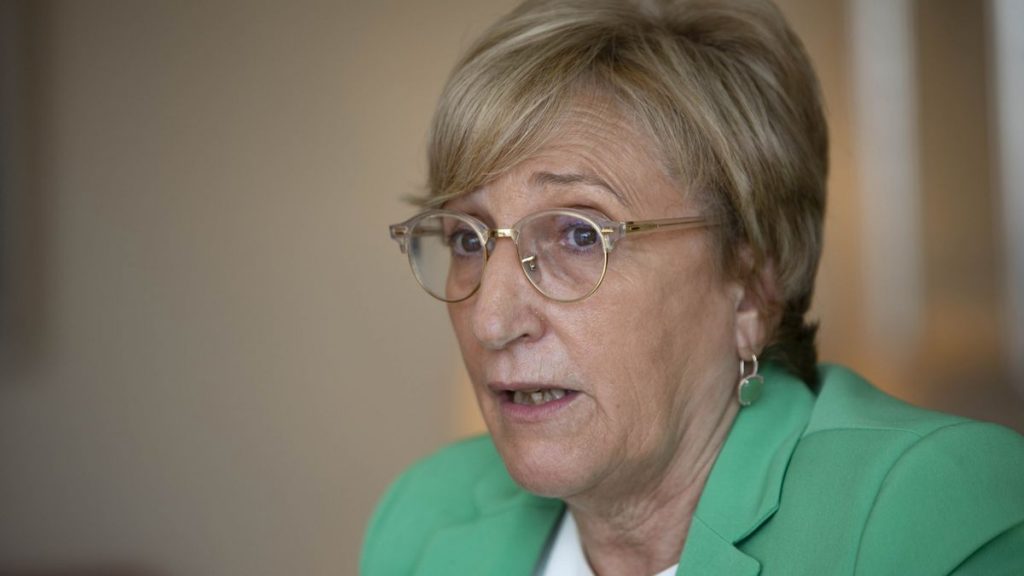Ana Barceló: “By mid-February there will be higher deliveries of vaccines to make up for last week’s reduction”

Monday 25th January 2021 | MIKE SMITH
The Valencian Health Minister, Ana Barceló, has revealed that by mid-February there will be more COVID-19 vaccine deliveries than those established to compensate for the reduction that took place last week when only 17,550 doses arrived from the 30,225 planned which forced the regional government to reschedule its vaccination plan.
“Over the next week we will continue to administer the second doses in residences and health personnel and, as soon as the Moderna doses arrive, we will begin the vaccination of the first line in private hospitals”, she explained.
This was announced during Barcelò’s appearance at the Permanent Council of Les Corts to report, at her own request, the situation of the pandemic in the Comunidad Valenciana and report on the COVID-19 Vaccination Plan.
Regarding the vaccination strategy, the minister explained that it is a flexible process, subject to the availability of doses. Thus, she recalled that, in this first phase, priority has been given to four population groups: residents and personnel in residences for the elderly and disability care centres, first-line health personnel, other health personnel and those at large non-institutionalized special need centres.
It was recently agreed that dental, dental hygiene and other health personnel who see patients without a mask for more than 15 minutes will also be vaccinated. And the next group to be vaccinated will be that of people over 80 years of age, which, according to the National Statistics Office, accounts for 276,531 people, 2.9% of the population in the Comunidad Valenciana.
“The rest of the groups that will be incorporated in the following stages will be agreed progressively as the doses arrive, their availability increases, as well as the information on the final characteristics of the vaccines and their immunity”, explained Barceló .
To date, 104,985 doses have already been administered in the Comunidad Valenciana.
Cumulative Incidence
The minister began her briefing by remembering the 4,131 people in the Comunidad Valenciana who have lost their lives to date due to COVID-19 and has again expressed her concern about the situation of the pandemic. “At this time, there is a sustained uncontrolled and widespread community transmission with sustained and growing pressure in practically all the health departments,” she confirmed.
Barceló reported that both the number of positive cases and hospitalizations and the number of deceased people has already exceeded the figures of the first wave and the accumulated incidence in the last 14 days is above the national average, with 1,245 cases per 100,000 inhabitants. The Comunidad Valenciana has also experienced 5,163 outbreaks since the beginning of the pandemic and, by age groups, in the last week cases predominated in the groups of 35 to 64 years (39%), over 64 (26%) and 15 to 34 years (23%).
A total of 4,338 people have been admitted to hospital, with a total of 586 patients in ICU beds at the moment. “The situation that our hospitals are experiencing involves an overload of care that requires the participation of personnel who voluntarily wish to continue providing service outside of their normal working hours,” said the minister, after recalling the agreement approved by the Consell last Friday for the provision of additional reinforcement modules in hospitals with a budget of more than 11 million euros.
“In addition, the field hospitals have already received the first COVID patients in Valencia, Alicante and Castellón, thus deploying contingency plans in the three Health Departments. We also have, as we already did during the first wave, the private health centers and establishments and mutual insurance companies for accidents at work, together with their staff, to be capable of being used in the fight against the pandemic, when it could not be adequately addressed with the material and human resources of the Valencian Health System “, added Barceló.
Restrictive Measures
The minister explained that the restrictive measures that have been adopted in order to stop the advance of the pandemic have taken into account the epidemiological evolution and the indicators marked in the document ‘Coordinated response actions for the control of transmission of COVID-19 ‘, prepared by the Alerts and Preparedness and Response Plans Report, agreed by the Plenary of the Interterritorial Council of the National Health System, in October 2020. “So far, we have issued 28 resolutions and 8 decrees, special measures have been adopted in 74 municipalities and, as of this Friday, the perimeter of 16 municipalities will be added during the weekend,” she specified.
She insisted on the case control strategy carried out through tracking and recalled that on January 21 the mechanism for the control of the pandemic was reinforced with the hiring of 100 new documentary technicians who are already operating since the Hospital La Fe de València, a contract that will remain until May 21.
“With the incorporation of the 100 technicians and the 1,892 Primary Care and Public Health professionals dedicated to contact tracing, added to the 300 Army soldiers operating in the Valencian territory, we have 2,292 trackers,” said Barceló, after underlining that “from the beginning we bet on this tool that has allowed us to control outbreaks and the spread of the virus.”
Finally, and in relation to vaccination again, the minister said that the arrival of vaccines was great news, very hopeful, after these hard months of pandemic: “the objective contained in the Vaccination Strategy is no other than to reduce the mortality caused by this disease through vaccination in a context of progressive availability of vaccines “.
To plan vaccination at the time when vaccines are exponentially increased, an extraordinary stock has been made available for the voluntary incorporation of retired personnel, not older than 70 years, of categories that the regional government may need to strengthen the workforce in case of mass vaccination. This has been a task to which the Professional Associations were also invited, which have been offered the possibility of opening a registry of active private health personnel who, voluntarily, want to collaborate in vaccination in a situation of health crisis like the one we live in, as the minister has recounted.
“In the Comunidad Valenciana, we have extensive experience in population vaccination and vaccination coverage is very high, which shows a great confidence of citizens in vaccination programs and in their health professionals.” In fact, childhood vaccination coverage in the region, as well as flu vaccination, allows us to trust both the management experience developed in times of pandemic, as well as the trust that citizens show towards vaccines”, concluded Barceló.



